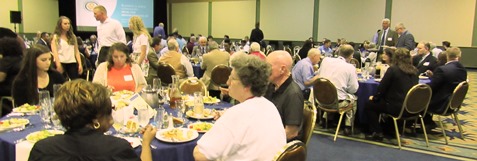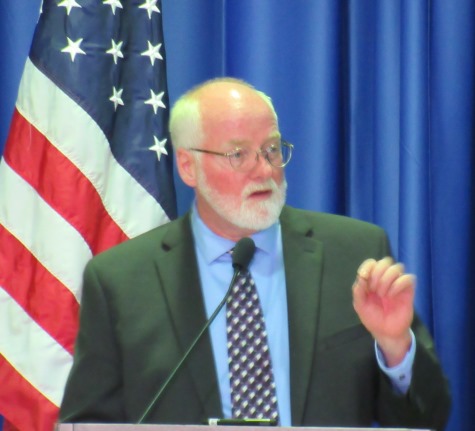
by Mary Rupert
Kansas City, Kansas Mayor David Alvey emphasized small steps toward growth in his first State of the Government message today.
“We can’t wait for the Unified Government to come in and transform the city,” Mayor Alvey said. “It’s not going to happen, folks.”
Instead, he urged residents and businesses to take small steps to improve their neighborhoods: to get to know other neighbors, get involved with neighborhood groups, pick up trash in the neighborhood, and put flowers in front of their businesses.
“Resiliency comes from our neighbors, resiliency comes from our neighborhood groups,” he said. “That’s the stuff of the life of this county. We could improve walkability. We could host some get-togethers.”
Alvey said during his speech that he supports holding down property taxes and reducing the PILOT (payment in lieu of taxes) fees on residents’ Board of Public Utilities bills. But he mentioned the UG also has identified some needs and expenses that should be taken care of, such as more security in the community, more elderly services needed, youth programs, the need to improve parks, streets, fire stations, the need to revitalize neighborhoods, and the need for a new juvenile facility. The goals of reducing taxes and providing better services may seem to be counter to each other, he noted.
The only path forward to achieve the goals, he believes, is through increased growth of residents and businesses in the community, to increase revenues.
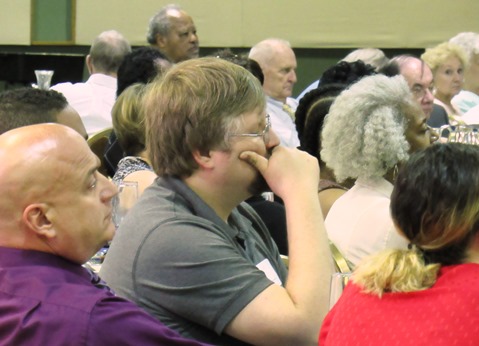
Alvey commended Officer Dennis Vallejo, who stepped forward to clean up and restore the statue of John Brown that had been vandalized recently. Vallejo restored the statue with his own equipment on his own time.
Alvey said the Unified Government needs to bring in new businesses and new residents, but it needs to start with doing small things and doing them well.
The simple and incremental improvements could be followed by some other efforts, such as innovating with policing strategies, installing security cameras along commercial corridors, supporting small businesses by helping them to navigate the licensing and planning process, training small investors to help them find ways to access capital to rehab older buildings and to build new, and bringing them into contact with investors, Alvey said.
He said the UG is rewriting the zoning ordinance to account for the unique conditions of traditional neighborhoods and small investors.
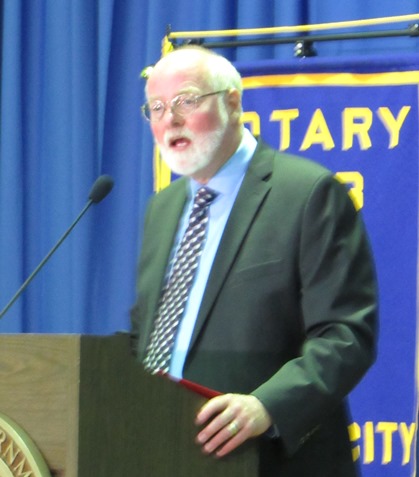
Alvey said the community needs to take hold of the special opportunity presented in an urban area between Freeman and Central avenues, from I-70 to 7th Street.
There is great ethnic diversity in this area, it is walkable, with parcels available for development and existing infrastructure, he said. Many businesses in this area are thriving, he said, naming several.
He announced the name of the new facility that will be in the old downtown EPA building, “The University of Kansas Health System, Strawberry Hill Campus,” near 5th and Minnesota. Also coming to the downtown area is a new grocery store near 5th and Minnesota, according to a recent announcement.
Traditional neighborhoods offer an advantage, Mayor Alvey said, and most have infrastructure already in place. Sprawl gets more expensive for cities.
“Perhaps the greatest asset of this area is the people who live, and work and operate businesses here,” Mayor Alvey said.
He added he was not saying this neighborhood in the downtown area was the only one that would receive attention from the UG – and the UG is not proposing to put a lot of money into any of the areas, because it isn’t there. He said he is asking everyone to consider that the assets already present would be coming into play and offer the opportunity to do the small things better, and to measure the effectiveness by improvements of the quality of life and improvements in property values.
Lessons learned in working with this downtown area neighborhood might be applied to the rest of the community. Alvey added the community will have to be careful not to pit one neighborhood against others.
If the UG could just build on 10 percent of its 7,400 vacant residential properties, it would significantly improve the economics of the community, he said. People are more likely to come where they already see some advantages, which is why he is urging people to “do the small things, do them well.”
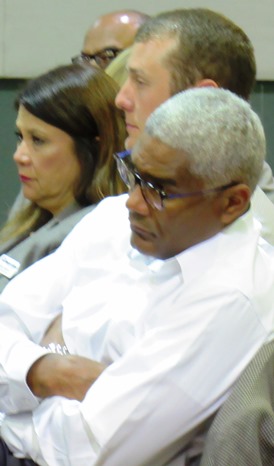
Alvey said residents need to recognize the assets in each neighborhood and do small things to improve the quality of life. The neighborhood improvements are not generated by the UG; the market is driving this. Those who already live here and those who are moving in create the market.
“It is the desire of folks to be here that is driving this growth, and that’s what we have to take advantage of,” he said. “It’s a special opportunity and we have to make the most of it.”
The goal is to learn and to bring the same level of dynamics to other neighborhoods throughout the community, he said.
“Over time, it’s the small things, one by one, bit by bit, that accumulate into great transformations,” Mayor Alvey said.
The UG will become more neighborhood-centric, with improvements in the quality of life for residents, retaining residents and attracting more residents, to improve the community’s tax base, Alvey said.
“We can unlock the potential of our neighborhoods,” Mayor Alvey said. “We must build our great community from our neighborhoods up.”
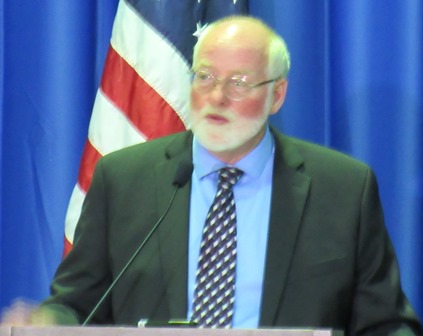
Mayor Alvey said that the community should also expect to see the addition of large-scale projects in the future, such as a new convention center, the American Royal, the Turner Diagonal area development, Fairfax industrial area development, and more development along K-32, K-7 and I-635.
He said the fundamentals of the county remain solid, but the community cannot rely solely on large-scale developments for growing the tax base. Based on what he has heard and seen, he said the community must do more for its older, traditional neighborhoods. Some neighborhoods have experienced decades of neglect or abandonment.
“These neighborhoods remain resilient because passionate and caring neighbors come together to fight the blight, to counter the crime, because they believe they deserve to live in a beautiful and safe neighborhood,” Alvey said.
About 340 persons attended the annual State of the Government speech held at the Reardon Center in downtown Kansas City, Kansas, said Crystal Watson, deputy chief of staff to Mayor Alvey. The annual event is sponsored by the Downtown Kansas City, Kansas, Rotary Club.
To reach Mary Rupert, editor, email [email protected].
